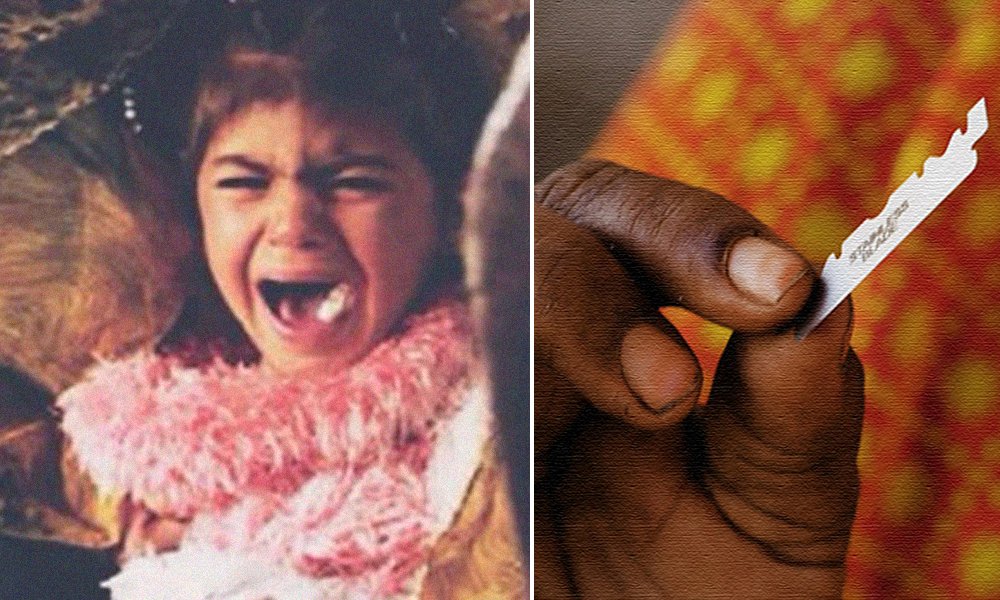
Image Credits: India Today, unicefusa (Representational Images)
4.1 Million Girls At Risk Of Female Genital Mutilation, A Practice That Scars Women For Life
7 Feb 2020 10:41 AM GMT | Updated 7 Feb 2020 10:51 AM GMT
Editor : Shubhendu Deshmukh |
Shubhendu, the quint essential news junky, the man who loves science and politics in equal measure and offers the complete contrast to it by being a fan of urdu poetry as well.
By : The Logical Indian Crew
We are an independent and public-spirited digital media platform for Indian millennials. We report news and issues that matter as well as give you the opportunity to take action.
In female genital mutilation, also known as circumcision, the external female genitalia are removed partially or completely for non-medical reasons.
Thousands of young women in India and around the world have to experience the horrific 'ritual' of female genital mutilation (FGM) every day. The cruel practise can is found in Africa, Asia, and the Middle East. The practice can also be found in certain communities in India where girls as young as six and seven are regularly being scarred in India.
The United Nations observes February 6, as International Day of Zero Tolerance for Female Genital Mutilation to spread awareness about the cruel practice, which the UN describes as "a catastrophic abuse of human rights".
What Is FGM?
According to the World Health Organisation (WHO) female genital mutilation are procedures "that intentionally alter or cause injury to the female genital organs for non-medical reasons." The procedures are usually performed between infancy and the age of 15.
According to the UN, around 4.1 million girls
in the world are at the risk of undergoing female genital mutilation in 2020.
According to WHO, there are many reasons for the practice to be still prevalent. It is considered necessary to raise a girl and prepare her for marriage and adulthood, to ensure premarital virginity, and marital fidelity, to increase marriageability. Quite often, FGM is associated with cultural ideals of femininity and modesty, and more.
FGM In India
In India, the practice can be found in the Dawoodi Bohra community, a Shia sub-sect of Islam. This painful process is carried out by untrained midwives, using sharp blades and knives.
The Bohras refer to FGMs as 'khatna', and for a long time, it was kept secret, a subject that was never discussed. They believe that the clitoral head is unwanted skin, 'haraam ki boti' or a 'source of sin' that will make them drift away from their marriage.
The practice is backed up decades of patriarchal belief that a woman might bring "shame" to the community by engaging in premarital sex and marital fidelity. The community believes that the practice will help a woman resist extramarital sexual desires.
Unfortunately, no law in India bans the practice.
The Muslim Bohra community is spread across the western cities of India, Pakistan, Yemen, East Africa, and some strewn parts of America and Australia.
Under Australia's female genital mutilation law, three Dawoodi Bohras in 2016 were sentenced to 15 months in jail. Two doctors in Detroit were arrested in 2017 by United States officials for allegedly cutting the private parts of six girls.
Due to these legal actions being taken against FGM among Bohras in Australia and USA, India is now becoming a hub for FGM.
In July 2018, senior advocate Abhishek Manu Singhvi representing Dawoodi Bohra Women for Religious Freedom had argued that the practice is an essential part of the religion and is protected under Articles 25 and 26 of the Constitution of India.
How Does FGM Affect Women?
FGM has no health benefits, but it only harms the women subjected to it. Removing and damaging healthy female genital tissue interferes with the natural functioning of the girls' body.
It may cause severe bleeding, infections, tetanus, paralysis of the bladder or blood poisoning. It may also result in death.
The use of dirty instruments may end up transmitting AIDS/HIV.
The victim may suffer from psychological trauma (depression, anxiety, post-traumatic stress disorder, low self-esteem, etc.) and loss of sexual sensation. It may cause long-term pain during menstruation and while urinating.
It may increase the risk of childbirth complications and newborn deaths. FGM is simply a merciless local tradition that beings its victims agony, pain and a lifetime of psychological trauma. It is time that proper initiatives are taken and laws implemented in India to ban the brutal practice completely.
Also Read: 'Why Did You Cut Me Mummy?' Survivors Share The Pain Of Female Genital Mutilation
 All section
All section














